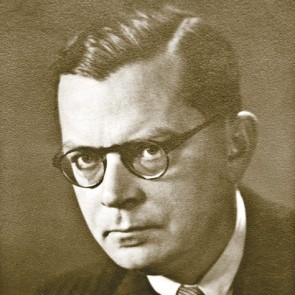01/03/2011
Correspondance inédite (suite)
From Haaretz.com
http://www.haaretz.com/print-edition/news/alone-in-jerusa...
Published 01:18 28.02.11
Latest update 01:18 28.02.11
Alone in Jerusalem: National Library unearths German writer's treasure trove

Discovery included dozens of letters that are part of an extensive correspondence between Rudolf Ditzen (Hans Fallada's real name) and the Austrian-Jewish writer Carl Ehrenstein.
By Ofer Aderet
Dr. Stefan Litt, an archivist at the National Library in Jerusalem, holds a thick folder. A month ago, when he began his job, he began examining cartons he was given. Among the mountains of old documents he suddenly saw a file labeled "Hans Fallada" - the pseudonymous author of the global best seller "Alone in Berlin." Litt says he began leafing through it, "and I found a treasure."
The discovery, revealed here for the first time, included dozens of letters that are part of an extensive correspondence between Rudolf Ditzen (Fallada's real name ) and the Austrian-Jewish writer Carl Ehrenstein. The letters shed new light on Fallada's tragic life. They were in Eherenstein's literary estate, which was turned over to the library a few years ago.
Fallada was born in 1892 in northern Germany. At age 16 he was struck by a horse-drawn cart; years later he had typhoid fever. At age 18 he and a friend made a pact to shoot each other in a duel. Fallada killed his friend, but he himself survived despite having shot himself in the chest.
As an adult he had frequently psychiatric hospitalizations and was also jailed repeatedly for morphine and alcohol abuse. He supported himself through journalism and other writing.
His best-known book, a novel set in Germany during the Great Depression, "Little Man, What Now," was published in 1932.
With the rise of the Nazis, Fallada was interrogated repeatedly over his refusal to join the Nazi Party. After he refused a proposal by Goebbels to write an anti-Semitic novel, he had a breakdown and was hospitalized in a facility for the criminally insane.
After the war a friend gave him a file, found among Gestapo documents, with information about a German couple who had rebelled against the Nazis. Fallada turned their story into "Alone in Berlin," completing it in just 24 days. He died a few weeks before it was published, in 1947. In 2009 the book was translated into English and last year it was published in Hebrew.
The newly discovered correspondence contains 25 letters from Fallada to Ehrenstein and 28 from Ehrenstein to him, from 1934-1938. Fallada wrote openly of his illness and anxiety. On August 3, 1935, he wrote Ehrenstein, by then safely in Britain, "Will I ever reach you? I doubt it. The need for quiet - to neither see nor hear a thing - grows stronger every day. Sometimes I dream of a wall three meters high around my yard. With no humans."
"There are many similar files hiding here that we hope to make accessible to the public," Prof. Haggai Ben-Shamai, the National Library's academic director, says.
The letters will be scanned and uploaded to an Internet site as part of a project to make around 150,000 rare books and documents from library archives available online.
On March 8 the library will hold a special workshop on Fallada and the letters. One of the speakers will be Tel Aviv University's Prof. Galili Shahar, a scholar of German literature.
"You open the file and touch the letters and the notes, and you are actually touching time. There is a lot of charm in it, but it is also frightening. It's like meeting a ghost," Shahar says. "The letters reveal the sad friendship between two authors in exile, one in London and one - Fallada - in internal exile in his home. Both were lonely and sought comfort in writing letters.
20:05 Publié dans Actualité, Eléments de biographie | Lien permanent | Commentaires (0)




Les commentaires sont fermés.